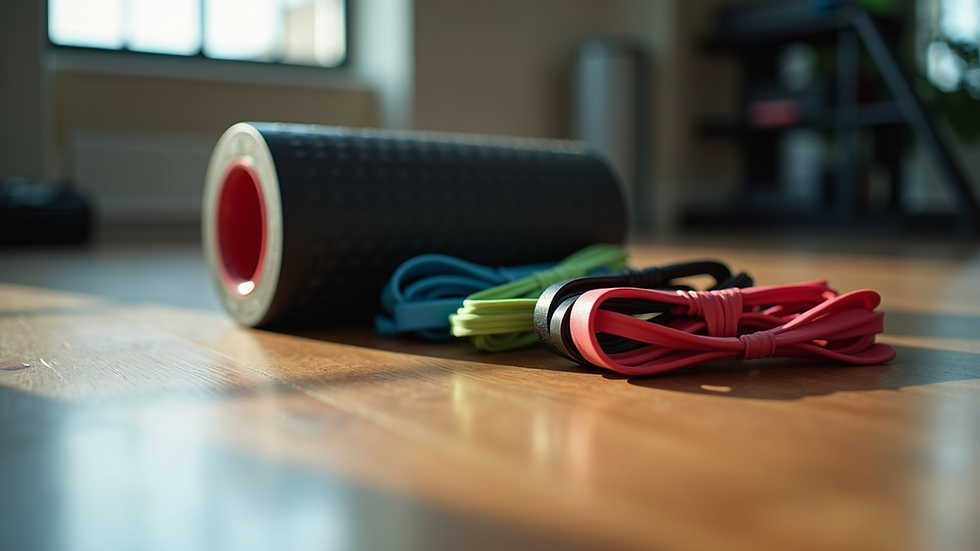Maximize Your Flexibility with Professional Techniques and Tips
- Stephanie Harvey
- Oct 16, 2025
- 3 min read
Improving your body's flexibility and movement capacity is essential for maintaining an active and healthy lifestyle. Whether you are recovering from an injury, managing chronic pain, or simply aiming to stay agile, understanding how to enhance your range of motion can make a significant difference. This guide explores the fundamentals of range of motion rehabilitation, practical strategies, and expert advice to help you regain and maintain optimal mobility.
Understanding Range of Motion Rehabilitation
Range of motion rehabilitation focuses on restoring the normal movement of joints and muscles. It involves exercises and therapies designed to increase flexibility, reduce stiffness, and improve overall joint function. This process is crucial after injuries, surgeries, or periods of inactivity, which cause muscles and joints to become tight or weak.
There are two main types of range of motion:
Active Range of Motion (AROM): Movements performed by the individual without assistance.
Passive Range of Motion (PROM): Movements performed with the help of a therapist or device.
Both types are important in rehabilitation programs, depending on the individual's condition and recovery stage.
Why Range of Motion Matters
Maintaining a good range of motion helps prevent injuries, reduces pain, and supports daily activities such as walking, bending, and reaching. Additionally, it enhances athletic performance and promotes better posture. Without proper range of motion, muscles can weaken, joints may stiffen, and the risk of falls or strains increases.

Effective Techniques in Range of Motion Rehabilitation
To successfully rehabilitate your range of motion, a combination of techniques is often used. These include:
Stretching Exercises:Fundamental to increasing flexibility.
Strengthening Exercises:Supports joint stability and enhances movement control.
Manual Therapy: Reduces stiffness and improves circulation.
Heat and Cold Therapy: Relaxes muscles and reduces inflammation.
Assistive Devices: Tools like resistance bands and foam rollers aid in exercises.

Can Range of Motion Be Restored?
The good news is that range of motion can often be restored, even after significant injury or prolonged immobility. The extent and speed of recovery depend on several factors:
Severity of the injury or condition
Age and overall health
Consistency and quality of rehabilitation efforts
Professional guidance and support
Early intervention is key. Starting rehabilitation soon after injury or surgery can prevent permanent stiffness and loss of function. However, even chronic conditions like arthritis can benefit from targeted exercises and therapies.
Steps to Restore Range of Motion
Assessment: A healthcare professional evaluates joint mobility and muscle strength.
Goal Setting: Clear, achievable goals are established based on individual needs.
Customized Exercise Plan: Exercises are tailored to target specific limitations.
Regular Monitoring: Progress is tracked, and the plan is adjusted as needed.
Education: Patients learn proper techniques and lifestyle modifications to maintain gains.
Patience and persistence are essential. Small improvements accumulate over time, leading to significant functional gains.

Practical Tips to Enhance Your Range of Motion
In addition to professional rehabilitation, there are everyday habits and practices that support joint health and flexibility:
Stay Active: Regular movement prevents stiffness.
Warm Up Properly: Always warm up before exercise.
Maintain Good Posture: Proper alignment reduces strain on joints.
Hydrate and Eat Well: Nutrition supports tissue repair.
Listen to Your Body: Avoid pushing through pain.
For those seeking to improve range of motion, consulting with specialists such as chiropractors or physical therapists can provide personalized guidance and advanced treatment options.
Moving Forward with Confidence
Ready to enhance your flexibility and achieve your health goals? Book a session with Optimum Human Dynamics today! Dr. McGilberry is here to provide personalized care and professional techniques tailored to your needs. Don't wait—take the first step towards optimal health and mobility. Contact us now to schedule your appointment!


Comments